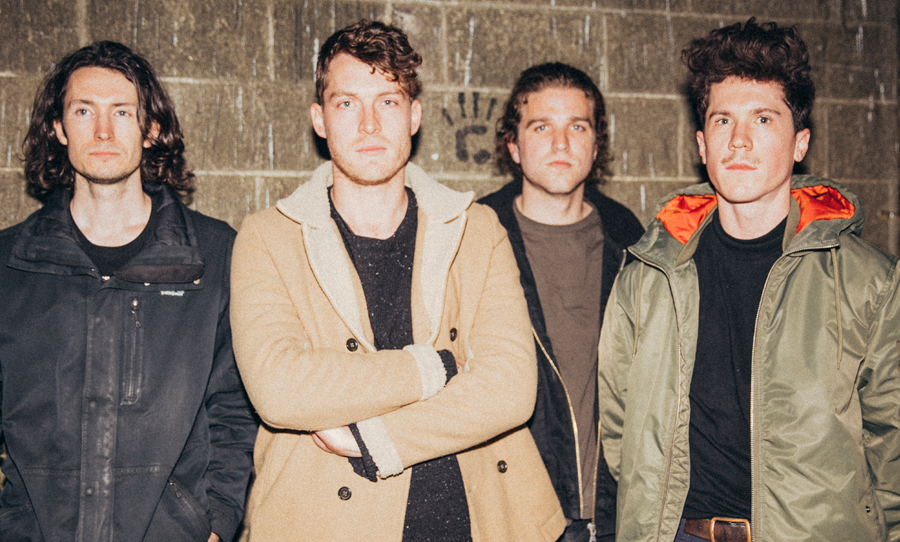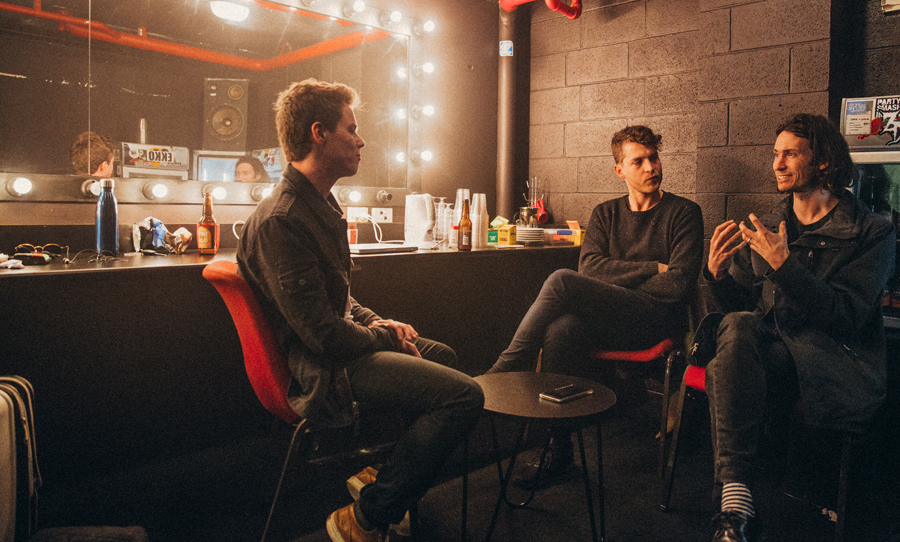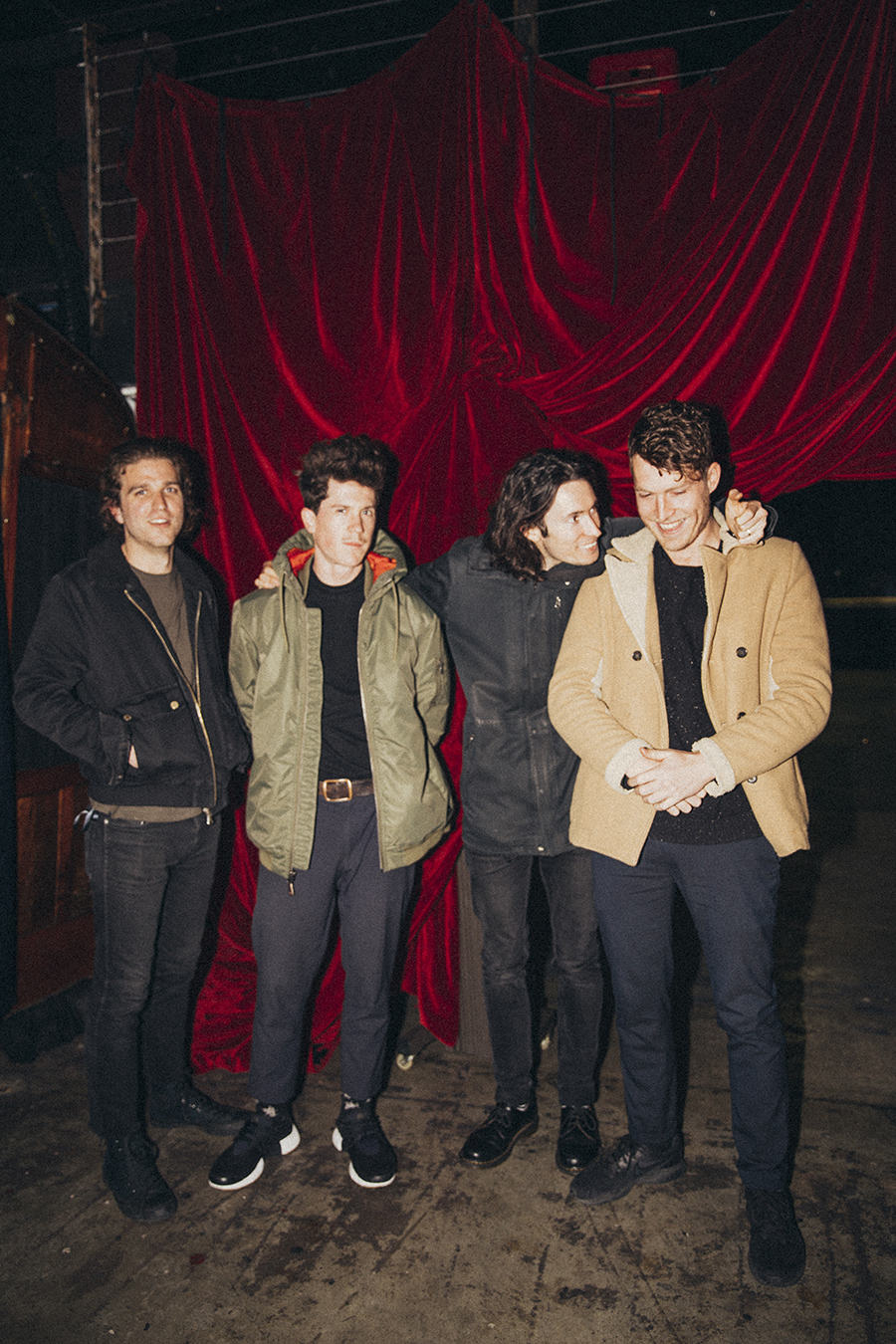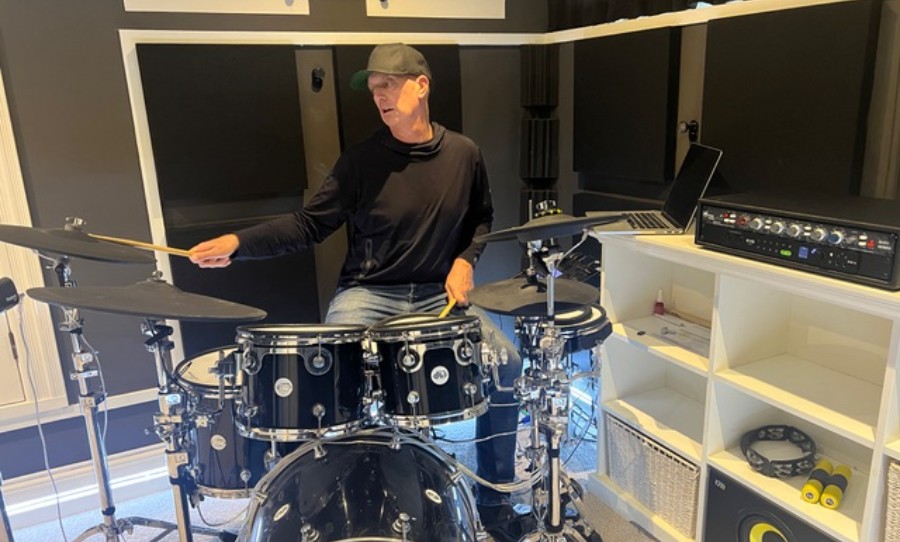Only four years ago, City Calm Down were one of the most talked about and hyped indie bands in the country. Their debut In A Restless House was a smash record released via indie-dream-team label I OH YOU. But then, just as the hype was building, the band disappeared. Or rather, retreated. Retreated from the limelight to render one of the most poignant albums you’ll hear all year, Echoes In Blue.
We sat down with singer Jack Bourke and keys man Sam Mullaly fresh from the sound check to their recent Sydney gig to talk about everything from stage design to the key theme of their new release (balance) and why we why we should all not worry so fucking much.

We sat down with City Calm Down backstage before their show at the Metro Theatre in Sydney to chat about why we all shouldn’t worry so fucking much.
HAPPY: I was just watching the sound check, and –
SAM: Oh you saw the soundcheck? Now we have to kill you.
HAPPY: It was very visual. Is the visual component as important as the music? Or is it just an afterthought?
SAM: I don’t think it’s an afterthought, it’s important…
JACK: The song has to be good without the visuals, but there’s a cinematic element where you’re kind of imagining the place for the song. So that conversation is already happening, at least in our own heads, and that informs how the songs look live. Often with video clips get pitched ideas and – particularly on this album – we’ve been lucky to work with directors who pitch ideas that we feel really represent or pair well with the music, and that translates onto the live show.
SAM: It’s a step in the process, I guess. You’ve got to start with the good song and then it’s the next thing that happens.
HAPPY: Do you know which songs are going to resonate with crowds before you play them live?
JACK: Sometimes. I think there’s songs that stick out, we’re fairly confident is gonna work out well. In This Modern Land we were playing before it got released and it was working well live. But there are some songs like Blame which have only started working after we released the song. But there just needs to be a certain number of people in the room who know the song for the whole room to quieten down a bit. Whereas when we were touring in September last year, no one knew the songs.
SAM: So people were talking through it a lot.
JACK: Whereas we’re finding now that everyone will… shut the fuck up.
SAM: Before it was released we’d start the song and nobody would know what it is so you’d hear nothing from the crowd, then people would start talking. We did actually have a talk about how can we capture the crowd more in these situations to draw people in, and now when we play it you can hear recognition and a murmur happen. So you’ve got those people at least, which helps.
JACK: The lights help as well, they can cue people.
SAM: Actually that’s a good answer for the question before, about how important are the lights. There are cues, for example, for Blame where the spotlight will go on Jack everything else will go down and then Jack will say something that kind of draws everything on to him to try and focus attention. So that, in a sense, answers the question from before. It’s a complete part of it, and discussions happens about how we can assemble that.

HAPPY: I’ve been listening to Echoes In Blue a lot, and to me, the overall theme seems to be about balance and finding a balance between everything. How did that theme come about?
JACK: Probably through a lack of a balance [laughs].
SAM: Experience.
JACK: Falling over. The lyrics are mainly a way of processing what I was going through at that specific time and just feeling like I had way too much on my plate, and I was teasing narratives out of that feeling. John, I’m Disappearing is partly inspired by a story my uncle was telling me about this friend of his who’d been married for forty years and his marriage broke down because he was always stuck at work. That was pretty bleak and the song felt pretty bleak. Musically it felt cold and harsh, beautiful in a way, but… I guess in many ways the music informs the lyrics. The melodies are written over the music and they’re often without set phrase or words, there’d be one or two…
SAM: Swords [pronounced ‘swerds’].
JACK: S-words, as Paul Kelly says. That’s his word for when it’s somewhere between a sound and a word. You get the balance between the meaning of the song and the sounds of the lyrics because the vowels and the consonants can affect the way the tonality comes across.
SAM: But the theme developed naturally as well. “That’s what this song is about”, “that’s what this song is about”, and then all of a sudden you have a collection of songs.
HAPPY: The lyrical content is quite heavy, but the music can be quite dancey in a way. Those two things don’t often go together…
SAM: I think we’ve always made music that’s been in that vein of being upbeat, so maybe it’s a continuation of the style of music we all enjoy making and passing that through a filter of these experiences and these themes coming out. Maybe there is a bit of juxtaposition there.
JACK: I guess it sort of follows in the line of bands that have been influential on us like Joy Division and the Smiths and the Cure. Definitely not breaking new ground there but there’s something in the movement that’s cathartic in a way. Maybe that’s why a sad song can still be energetic because often when you’re sad you’re trying to offset that sadness by doing something else that might distract you from that.
HAPPY: One of my favourite songs on the album is “Distraction/Losing Sleep”, which is a lament on technology and social media. But as an indie band that relies a lot on social media to promote yourselves, do you see the irony there?
JACK: Yeah.
SAM: Definitely.
HAPPY: Was that intentional?
SAM: It’s part of it I guess. We’re locked to it, we have to make content, so we’re exposed to that.
HAPPY: So you don’t feel a choice?
SAM: It’s a choice to do it. I mean, you could not do it. We prefer to do it. But it is ironic that we’re experiencing the things that are happening maybe not just in the context of what happens in the band but what happens in life in general every day. We feed that, though.
JACK: Yeah.
SAM: That’s what people are looking at. They’re on the way to work and they’re looking at this stuff, the content we’re making, so we’re feeding that beast.
JACK: I think the line in the lyrics that took me a while to work out how to get it across is the line “In the dust all I’ve acquired is moments of truth”, and it’s essentially saying that you’re not really gaining anything of substance. You’ll be on Instagram and see beautiful things and funny things or whatever it is, but you’re not really engaging with it in a substantial way.

HAPPY: Finally, have you found a balance?
JACK: No, but there are times when you’ve got your shit sorted and there are times when you don’t. I think there’s an element where you’re kind of, particularly in Australia… there’s no live or die kind of moments. So all the pressure you’re putting on yourself is “Am I gonna get a better job?”, “How many people are gonna like my Instagram post?” It’s all rubbish really. And I think because of that it’s easier to get fixated on these things that are not meaningless. They’re meaningful to each person individually, but in context, there’s not a wake-up moment required where it’s like “Hold on a second, what are the things we’re actually worrying about?” The album’s, in a sense, like that. I was going through this period where I was really fucking worried all the time, and now I can stand back from it and be like “Geez, that wasn’t a good way to be… what was I worrying about?” You sort of tie yourself up in knots over it, and going forward I don’t know if I ever want to go back to that place because you feel shit a lot of the time.
Echoes In Blue is out now via I OH YOU. Listen to it here.


